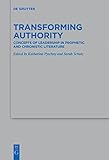Transforming Authority : Concepts of Leadership in Prophetic and Chronistic Literature / ed. by Katharina Pyschny, Sarah Schulz.
Material type: TextSeries: Beihefte zur Zeitschrift für die alttestamentliche Wissenschaft ; 518Publisher: Berlin ; Boston : De Gruyter, [2021]Copyright date: ©2021Description: 1 online resource (VIII, 322 p.)Content type:
TextSeries: Beihefte zur Zeitschrift für die alttestamentliche Wissenschaft ; 518Publisher: Berlin ; Boston : De Gruyter, [2021]Copyright date: ©2021Description: 1 online resource (VIII, 322 p.)Content type: - 9783110646313
- 9783110647150
- 9783110650358
- online - DeGruyter
- Issued also in print.
| Item type | Current library | Call number | URL | Status | Notes | Barcode | |
|---|---|---|---|---|---|---|---|
 eBook
eBook
|
Biblioteca "Angelicum" Pont. Univ. S.Tommaso d'Aquino Nuvola online | online - DeGruyter (Browse shelf(Opens below)) | Online access | Not for loan (Accesso limitato) | Accesso per gli utenti autorizzati / Access for authorized users | (dgr)9783110650358 |
Frontmatter -- Preface and Acknowledgements -- Contents -- I: Introduction -- Introduction -- II: Concepts of Leadership in Selected Prophetic -- Literature -- Why Judean Monarchy Failed: A Discourse on Leadership in Jer 21:1–23:8 -- Prophetic Leadership as Resistance: The Case of Baruch and -- Ebed-melech (Jeremiah 36–38) -- Kingship and Priesthood – Reloaded (Jer 33:14–26) -- The Leadership of the Judean Community according to the Book of Haggai -- Messianism in Transition: Zech 9:9–10 between First and Second Zechariah -- Zechariah 9–14 and the Transformations of Judean Royal Ideology during the Early Hellenistic Period -- III: Concepts of Leadership in Chronistic -- Literature -- Conflicting Roles of Leadership in the Temple Building Account of Ezra 1–6 -- Was Ezra a Persian or a Yehudite Leader? -- Leadership in the World of Memories Evoked by Chronicles in the Context of the Late Persian/Early Hellenistic Period -- Reflections on Leadership in Achaemenid Yehud: Case Studies from the Chronicler’s Imperial, Provincial, Tribal, and Cultic Rhetoric -- Judges, Elders, and Officers in Chronicles -- Diseased Leadership -- IV: Comprehensive Aspects of Leadership in -- Prophetic and Chronistic Literature -- Zerubbabel, Joshua and the Restoration of the Temple – A Comparative Approach to the Concepts of Leadership in Haggai/ Zech 1–8 and Ezra 1–6 -- Concepts of Prophetic Leadership in Chronicles and Their Relation to Prophetic Literature -- List of Contributors -- Index of Biblical References
restricted access online access with authorization star
http://purl.org/coar/access_right/c_16ec
Human leadership is a multifaceted topic in the Hebrew Bible from a synchronic as well as diachronic perspective. A large range of distributions emerges from the successive sharpening or modification of different aspects of leadership. While some of them are combined to a complex figuration of leadership, others remain reserved for certain individuals. Furthermore, it can be considered a consensus within scholarly debate, that concepts of leadership have a certain connection to the history of ancient Israel which is, though, hard to ascertain. Following a previous volume that focused on the Pentateuch and the Former Prophets (BZAW 507), this volume deals with different concepts of leadership in selected Prophetic (Hag/Zech; Jer) and Chronistic literature Ezr/Neh; Chr). They are examined in a literary, (religious-/tradition-) historical and theological perspective. Special emphasis is given to phenomena of transforming authority and leadership claims in exilic/post-exilic times. Hence, the volume contributes to biblical theology and sheds new light on the redaction/reception history of the texts. Not least, it provides valuable insights into the history of religious and/or political “authorities” in Israel and Early Judaism(s).
Issued also in print.
Mode of access: Internet via World Wide Web.
In English.
Description based on online resource; title from PDF title page (publisher's Web site, viewed 28. Feb 2023)


